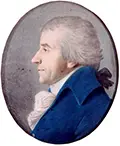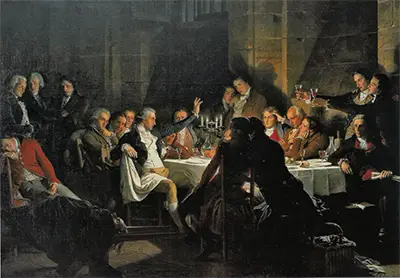Jacques Pierre Brissot: Girondin Leader
Jacques Pierre Brissot was a writer and lawmaker who was a leader of the Girondins during the French Revolution. He was also one of its victims. 
He was born on Jan. 15, 1754, at Chartres. He graduated from the University of Orléans. His first work experience was as a law clerk, in Chartres and then in Paris. However, he wanted to be a writer. He moved to London and found work as a writer; among his earlier works were treaties on ethics and the law. He also got married, to Félicité Dupont; they had three children. Influenced by the writings of Jean-Jacques Rousseau, Brissot proposed to unite the intellectuals of Europe in a sharing of views via a newspaper that he planned to publish. He even had a name, the Journal du Lycée de Londres. He had earlier found work writing for other publications, including the Mercure de France and the Courrier de l'Europe. This experience was not enough for him to be able to convince others to join his collaborative cause, and he returned to Paris. Brissot had published a pamphlet on prison reform titled Théorie de lois criminelles. He also published other writings critical of the queen, Marie Antoinette. The French government judged him as attacking the government and its queen and ordered him arrested and sent to the Bastille. He was released in October 1784. Undaunted, he wrote an open letter to Emperor Joseph II of Austria, in which he argued for the right of revolution if a people judged its ruler to be oppressing them. Brissot had met with a number of abolitionists in London. In 1788, he founded a French anti-slavery group called the Society of the Friends of the Blacks. He traveled to the United States to talk with proponents of abolition there, also meeting with representatives to the Constitutional Convention. The American Academy of Arts and Sciences elected him an honorary member. He returned to France convinced that the ideas of the American Revolution could be brought to bear on French society. When the French Revolution began, he embraced it wholeheartedly. 
Brissot joined the Jacobin Club, the most well-known of France's political clubs, and delivered many speeches there. He won election to two legislative bodies, the Legislative Assembly and the National Convention, whilel also continuing to write, publishing the influential Patriote français. He joined a group of deputies mainly from the Gironde who became known as Girondins. They were more moderate in their views of what the new French government and society should be. Opposing them were the more radical Montagnards. Brissot rose to the leadership of the Girondins, who also became known as Brissotists. Like many other Girondists, Brissot championed war with Austria and Prussia, as a means of spreading the republicanism then being embraced in France. Girondists controlled nearly all of the levers of government at this time and enjoyed great success. Brissot was head of the Legislative Assembly at the time of the Declaration of Pillnitz, a warning from Austria and Prussia that should the French people harm King Louis XVI, then the other countries would retaliate the politics of France itself. After the Storming of the Tuileries and the arrest of the king, Brissot and the rest of the deputies disagreed on what to do with the king. Most if not all Montagnards wanted him executed. Brissot and others favored keeping the king alive, fearing that his death would embolden France's enemies all the more. Another idea that Brissot floated was to seek the will of the people in the form of a referendum. The Convention had other ideas and voted for the king's execution. He was executed on Jan. 21, 1793. 
Also significant in September 1792 was a series of massacres of political prisoners who had opposed the Revolution. Girondins denounced such violence and blamed the Montagnards for endorsing it. The Montagnards were increasingly allying themselves with other radical elements from the Third Estate, notably the Paris Commune and a large number of sans-culottes. On May 31 and June 1–2, those forces combined to remove the Girondins from the Convention and place many of them under arrest. Many Girondins escaped arrest and fled Paris, later joining in Caen in an effort to form a rebellion. Brissot not was one of those. The Revolutionary Tribunal tried Brissot and 21 other Girondin former deputies and ordered the execution of all of them. They died on Oct. 30, 1793. |
|
Social Studies for Kids
copyright 2002–2024
David White




